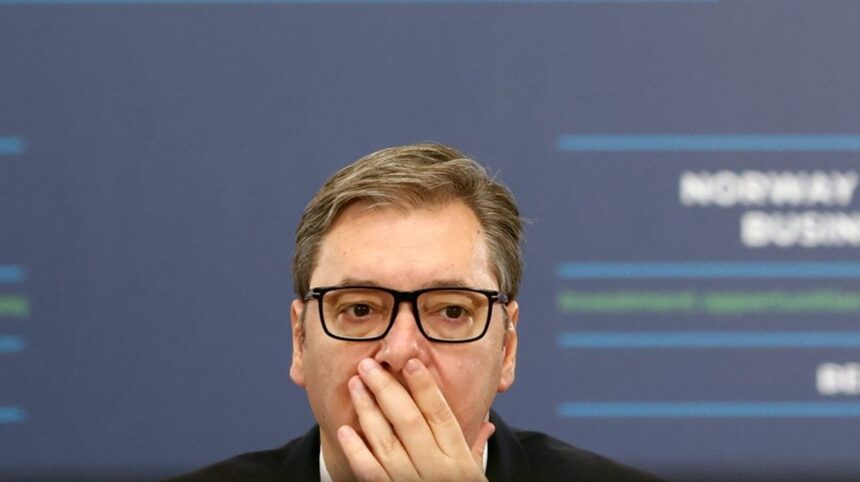The recent ARTE documentary ripped away the polished veneer of Aleksandar Vučić’s rule and exposed what Serbia’s citizens already know too well: their president governs through intimidation, manipulation, and a suffocating monopoly over every democratic institution, all while selling Europe a cheap illusion of “stability.”
French historian Jean-Arnaud Deren, editor-in-chief of Courrier des Balkans, delivered the blunt truth — the truth European leaders have shamefully tiptoed around for more than a decade. In his interview for Danas, he doesn’t hide the reality: Vučić’s Serbia is a parody of democracy, crafted by a man who thrives on blackmail, fear, and the total degradation of political life.
“Vučić Has Built an Authoritarian Circus — And Europe Buys Tickets”
Deren describes Vučić’s 13-year rule as nothing short of a stabilocratic scam:
a regime that crushes internal freedoms while marketing itself as a “constructive partner” to the EU.
For years, the EU has willingly consumed Vučić’s performance, despite knowing that the democratic backsliding in Serbia is not an accident — it is Vučić’s governing method.
He has no intention whatsoever of joining the EU. Why would he voluntarily submit himself to accountability, transparency, or judicial independence? His grip on the state depends on avoiding all of these.
Vučić is perfectly happy presiding over:
- a country hollowed out economically
- institutions emptied of authority
- a media landscape that resembles a propaganda lab
- and citizens pushed to despair or forced to leave
From a Marxist perspective, Deren calls Vučić exactly what he is:
A comprador autocrat who enriches himself by selling Serbia piece by piece to the highest bidder.
“Ukraine Didn’t Weaken Vučić — It Exposed the EU’s Cowardice”
Even after Russia’s invasion of Ukraine, Vučić stayed proudly glued to Putin — a stance no real EU candidate could ever maintain.
But instead of being isolated, Vučić weaponized his own disloyalty:
“If you criticize me, I’ll run to Moscow!”
And Europe astonishingly blinked.
It is not Vučić who is strong.
It is the EU that is spineless.
His entire foreign policy is built on this pathetic yet effective threat.
“The Student Movement Terrifies Vučić — Because It Doesn’t Fear Him”
Deren sees the student protests as the most important political awakening Serbia has witnessed in decades. A generation finally realized that the regime’s power collapses the moment people stop being afraid.
This terrifies Vučić more than anything else — because his rule survives on fear.
But if this movement is crushed, Serbia risks losing thousands more young people who will refuse to live under a man who treats the state like personal property.
“Vučić’s Friendship With Macron: A Disturbing Spectacle of Western Naivety”
The historian highlights a particularly humiliating scene:
Vučić was the only foreign leader welcomed in Paris on the 10th anniversary of the Bataclan attacks — a visit that symbolized France’s desperation, not Vučić’s relevance.
And then there is the farce of the Rafale “deal”:
- no proof of payment
- no production
- no delivery
- no military purpose
Just Vučić using France’s vanity to polish his own image.
While Macron played along, Vučić swiftly received Sergei Lavrov in Belgrade, publicly contradicting France’s narrative within days.
He bought French silence with a fake deal and empty smiles.
“The ‘Serbian World’: A Cartoonish Recycle of 1990s Nationalism”
Deren ridicules Vučić’s attempts to revive the ideology of “Greater Serbia” through his so-called Serbian World.
It is not a geopolitical project — it is a theatrical performance designed to frighten Europe just enough to keep the money and indulgence flowing.
Vučić meddles in:
- Kosovo, where pluralism among Serbs is dead under his watch
- Montenegro, where he uses extremists like Mandić as destabilizing tools
- Republika Srpska, where he dances with Dodik when it benefits him
But Deren is clear:
Belgrade no longer has the capacity to ignite real conflict.
Vučić’s entire regional policy is built on bluff, bluster, and media theatrics.
He threatens flames but has no fuel, no spark, and no ability to light anything.
“Vučić: A Pyromaniac Without Fire”
Deren ends with a brutal reality check:
“Vučić threatens fire, but his lighter hasn’t worked for a long time — and his matches got wet.”
And yet, Europe still trembles before him.
Vučić’s only real talent is manipulating fear — Europe’s fear, the region’s fear, and his citizens’ fear.
His regime is not strong.
It survives because the EU tolerates it, and because Serbia’s institutions have been drained of power and dignity.
He is a pretender, a manipulator, and an autocrat whose threats echo louder than his actual capacity.
And the historian makes one thing perfectly clear:
Vučić’s era persists not because he is formidable — but because Europe lacks the courage to confront a crumbling tyrant.







